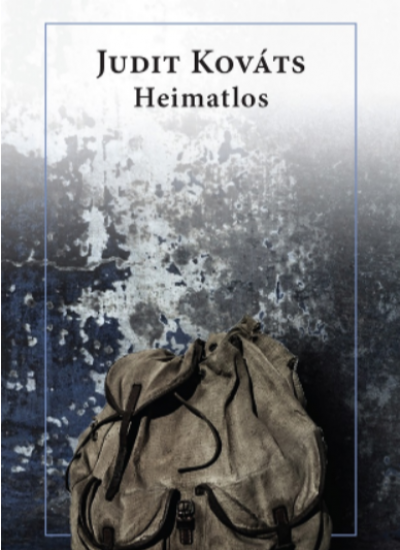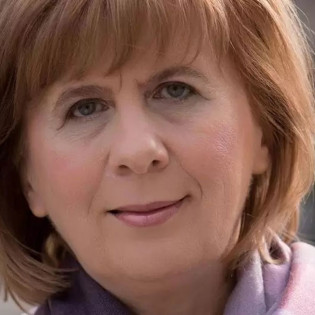Homeless

Homeless, a novel by Judit Kováts, was published in Hungary by Magvető Publishing House in 2019.
The topic and questions of the novel:
The fate of the German minority in Slovakia and the notion of collective guilt in Czechoslovakia after the war in light of the complete deprivation of people’s rights. Do ordinary people have a choice when they become historical figures, or do they simply suffer the destinies fate has allotted them? Nationality as identity. Where is home? The dilemma of staying or leaving. Being a stranger in a new homeland, the difficulties or the impossibility of integration. Can one find a way of coping psychologically with a past filled with traumas?
Main locations:
- in Slovakia and Czechoslovakia: Kezmarok, Nováky, Olomouc
- in Austria: Ernstbrunn
- in Bavaria: Bad Reichenhall, Munich, Blumenstadt (a fictional city)
Main characters:
- Lilli Hartmann and her family (her parents, grandmother, sister, and brother-in-law)
- Martin: the orphaned son of Lilli’s sister
- Julius Stein: the lifelong love of Lilli
- Elsi, Anni, Jarinka: best friends of Lilli
Time at which the novel is set: 1944–1953
Storyline:
Lilli Hartmann, a student in the evangelical high school of Kezmarok, lives her life with her Hungarian and Slovakian schoolmates far from the war. She is a talented pianist who goes skiing in the winter and climbs mountains in the summer. She is a big fan of the Tátra Mountains and Kezmarok, her “fairytale town,” and she is in love with her Hungarian schoolmate Péter. She is also uneasy about an upcoming Latin test. The Slovak partisan uprising of August 1944 turns this idyllic world upside down. Mass murders of German-speaking inhabitants are followed by the compulsory evacuation of German-speaking children, including students at the high school, to Austrian and Bavarian camps. The Hungarian-speaking and Slovak-speaking students can stay. This is the first time Lilli is faced with the defining role of ethnic identity.
The war has ended, but the end of armed fighting brings no peace for German speakers. According to the Beneš decrees, they are collectively criminals; they are deprived of their citizenship and their properties. Lilli and her family end up poor and homeless in the street. They find shelter in the tiny room of a Slovak acquaintance, but only for a while, because in September 1954, the Czechoslovak people’s court sentences her father to 20 years of forced labor, and Lilli and the other Germans of Kezmarok are sent to the biggest concentration camp in Slovakia, Nováky. Her sister Polli gives birth to her son Martin here, but she then falls victim to a typhoid epidemic. Polli’s husband Gerti disappears on the front, so Lilli has to take care of the baby, who constantly leaves the camp to ask for milk in the nearby villages or roam the fields.
In September 1946, freedom comes after a year of captivity; every German-speaker is expelled from Czechoslovakia. However, Germany is in ruins, and the refugees must grapple with a shortage of homes and of food, rations, a ticket system, and an array of camps. They are free, but they find themselves facing another kind of destitution. And integration is not a story of success. The Germans who are left in cities in ruins after the war are openly hostile to the refugees, despite the fact that they speak the same language. For them, the refugees are like wandering Gypsies. They are strangers, and they are seen as a kind of punishment for the lost war, like a third plague after wild boars and potato beetles. The locals protest against the presence of the refugees by rewriting the prayer to God: please send the scum home.
In the camp in Nováky, Lilli gets to know the medic Julius Stein, and they fall in love. During the deportation, they manage to remain together in the first Bavarian camp, but later, they are torn apart. Julius ends up near Munich in what had been the camp of Dachau, which has become a home for hundreds of refugees. With her mother and the two-year-old Martin, Lilli goes to Blumenstadt, also to what had been a concentration camp. Letters and meetings every two weeks on Sunday: for many long years that is all they get.
Lilli Hartmann is one of the 12 million Silesian, Pomeranian, Sudeten German, Carpathian German, Hungarian, and Danube Swabian people who were branded criminals after the war, were sentenced to forced labor, were tortured, killed, held behind barbed wire, and expelled from their homelands.
The main characters of Homeless are fictional characters, but everything that happens to them happened to real people in the wake of the war. But despite the traumas and tragedies they endured, the novel is optimistic, since Lilli Hartmann and her group end up finding a new home and take part in rebuilding Germany and laying the foundations of a common Europe.

Judit Kováts is a writer and former historian-archivist. Many of her scholarly works - volumes, studies, articles - have been published about the 19th century, including the Reformation. Her research interests also included military history and military cartography. She has published short stories, portfolios in various literary journals and portals. Denied is her first novel.
Her works
Denied (novel, Seeder, 2012)
Interrupted (novel, Seeder, 2015)
Homeless (novel, Seeder, 2019)
Awards
NKA Creative Scholarship, 2014, 2017
Prima Award (Szabolcs-Szatmár-Bereg County), 2018
Artisjus Literary Prize (prose), 2020